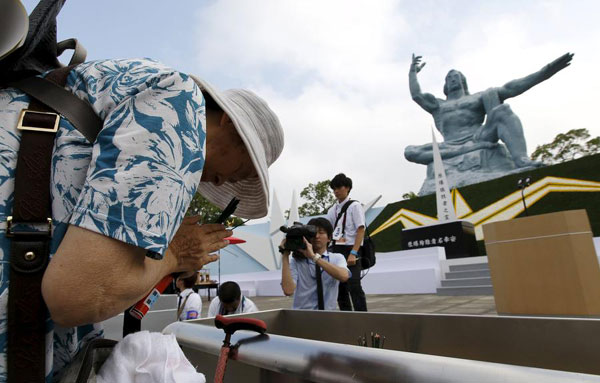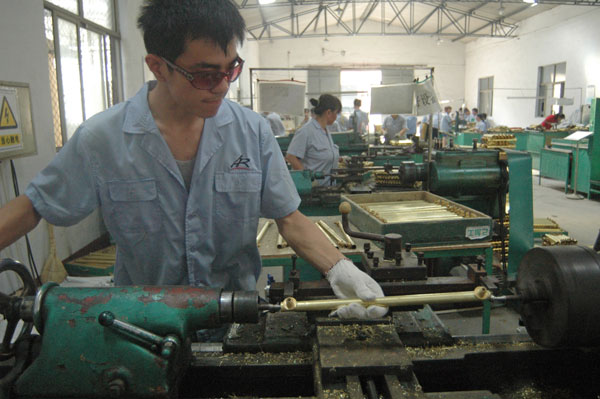Nagasaki mayor urges gov't to dispel concerns over controversial security bills
Updated: 2015-08-09 13:53
(Xinhua)
|
|||||||||||
|
 |
|
A woman prays for victims of the 1945 atomic bombing in front of the Peace Statue before a ceremony commemorating the 70th anniversary of the bombing, at Nagasaki's Peace Park in Nagasaki, western Japan, August 9, 2015. [Photo/Agencies] |
Meanwhile, the mayor emphasized that the peaceful path Japan has pursued in the past 70 years should never be changed for the sake of Nagasaki.
He also asked Japanese young generation not to push aside wartime experiences told by the old generation since what the elders experienced could in the future happen to the Japanese young generation.
For his part, Abe, avoiding mentioning the security bills in his speech, said Japan will make efforts to reach the goal of a world free of nuclear weapons and he reiterated Japan's three non- nuclear principles that he failed to touch in Hiroshima in a similar commemorating event.
"As the only country in the world to have experienced the horror of nuclear devastation in war, Japan will look for a world free of nuclear weapons abiding by the three non-nuclear principles of no possessing, no producing and no permitting the introduction of nuclear weapons into Japan," Abe said at the Nagasaki event.
However, Japan's Defense Minister Gen Nakatani said only one day before Thursday's Hiroshima event commemorating the atomic bombing that the security bills theoretically allow Japan's Self- Defense Forces to help its allies transport nuclear weapons for logistics support.
Opposition lawmakers criticized the remarks by saying the prime minister is flip-flopping on the issue as on one hand, Abe claimed to create a world free of nuclear weapons and on the other hand, he is trying to push forward bills that allow Japan to transport nukes.
Japan's Hiroshima and Nagasaki are the only cities in the world that suffered from nuclear bombings. The United States dropped two nuclear bombs on the two cities on Aug. 6 and Aug. 9 in 1945 respectively in a move to accelerate Japan's surrender in WWII.
Japan was a major aggressor that launched wars of aggression against China, Southeast Asian countries and the United States in the 1930s and 1940s. Japan surrendered to the Allied Forces on Aug. 15, 1945, days after the atomic bombings.
Today's Top News
China rejects Philippine, Japanese, US claims on S. China Sea issue
MH370 passengers' families want more answers
'New Suez Canal' opened
for ship traffic
Trump won't rule out third-party run
China asks further probe into MH370
China's property taxes coming soon
Seven arrested for trafficking women into sex slavery in China
ROK's ex-first lady begins
DPRK visit
Hot Topics
Lunar probe , China growth forecasts, Emission rules get tougher, China seen through 'colored lens', International board,
Editor's Picks

|

|

|

|

|

|






